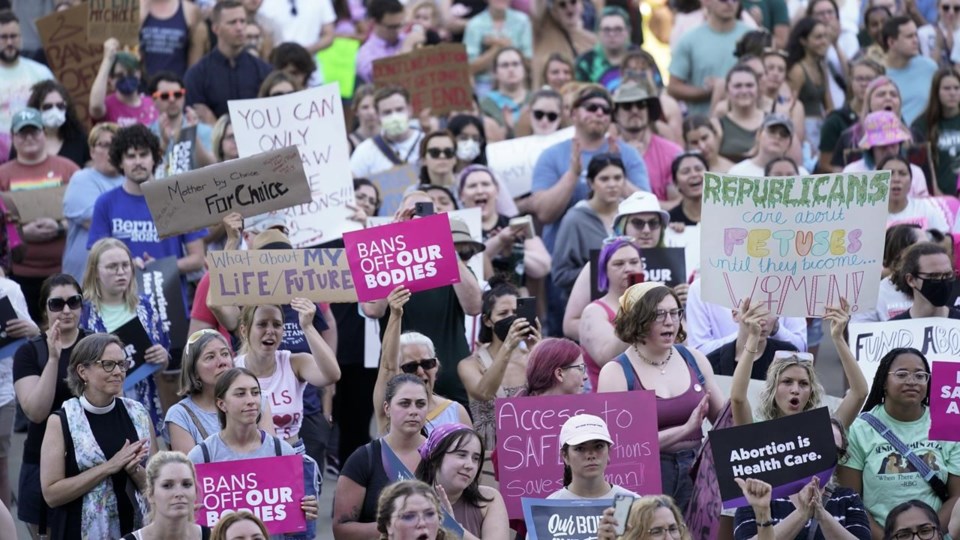LANSING, Mich. (AP) â A Michigan judge on Friday blocked county prosecutors from enforcing the stateâs 1931 ban on abortion for the foreseeable future, after two days of witness testimony from abortion experts, providers and the stateâs chief medical officer.
The ruling follows a state Court of Appeals ruling this month that county prosecutors were not covered by a May order and could enforce the prohibition following .
âThe harm to the body of women and people capable of pregnancy in not issuing the injunction could not be more real, clear, present and dangerous to the court,â Oakland County Judge Jacob Cunningham said during his ruling Friday.
David Kallman, an attorney for two Republican county prosecutors, said an appeal is planned.
âThe judge ignored all of the clear legal errors and problems in this case, it appears to me, simply because the issue is abortion,â Kallman told The Associated Press following the hearing.
Cunningham filed a restraining order against county prosecutors hours after the Aug. 1 appeals court decision and following a request from attorneys representing Democratic Gov. Gretchen Whitmer.
Although a majority of prosecutors in counties where there are abortion clinics have said they will not enforce the ban, Republican prosecutors in Kent, Jackson and Macomb counties have said they should be able to enforce the 1931 law. Macomb, which is just north of Detroit, and Kent, in western Michigan, are the state's third- and fourth-most populated counties, respectively.
Cunningham listened to arguments Wednesday and Thursday in Pontiac before granting the preliminary injunction, which is expected to keep abortion legal throughout the state until the Michigan Supreme Court or voters could decide in the fall.
In his ruling, Cunningham found all three of the state's witnesses âextremely credibleâ while dismissing testimony from the defense witnesses as âunhelpful and biased.â
The 1931 law in Michigan, which was triggered after the U.S. Supreme Court decision to overturn Roe v. Wade, bans abortion in all instances except the life of the mother. The dormant ban was retroactively blocked from going into effect in May when .
The state Court of Appeals later said that the preliminary injunction only applied to the attorney generalâs office, meaning that providers could get charged with a felony by some county prosecutors.
While Kallman said during closing arguments Thursday that granting a preliminary injunction isnât how laws should be changed, attorneys representing Whitmer argued that allowing county prosecutors to decide whether to enforce the 1931 ban would cause confusion.
âI'm relieved that everyone in this state knows that it doesnât matter what county you live in now, you are not as a provider going to be prosecuted," Oakland County Prosecutor Karen McDonald said following the ruling. Oakland is the second-most populated Michigan county. The prosecutor for Wayne County, which includes Detroit and is the state's most populous, had also said she would not pursue such cases.
A ballot initiative seeking to enshrine abortion rights into the stateâs constitution turned in 753,759 signatures in July and is expected to ultimately decide the status abortion access in Michigan. for the November ballot by the stateâs Board of Canvassers.
âThis court finds it is overwhelmingly in the public's best interest to let the people of the great state of Michigan decide this matter at the ballot box,â Cunningham said Friday.
The status of abortion in Michigan is expected to drastically impact the battleground stateâs November general election, where Whitmer and Attorney General Dana Nessel, also a Democrat, have made abortion rights .
âAbsent this preliminary injunction, physicians face a very real threat of prosecution depending on where they practice," Nessel said in a statement issued following Friday's ruling.
___
Joey Cappelletti is a corps member for the Associated Press/Report for America Statehouse News Initiative. is a nonprofit national service program that places journalists in local newsrooms to report on undercovered issues.
Joey Cappelletti, The Associated Press



